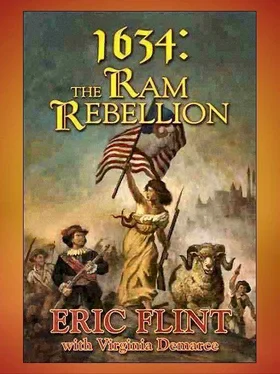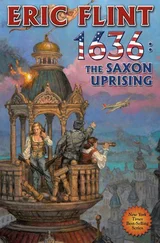Eric Flint - 1634 - The Ram Rebellion
Здесь есть возможность читать онлайн «Eric Flint - 1634 - The Ram Rebellion» весь текст электронной книги совершенно бесплатно (целиком полную версию без сокращений). В некоторых случаях можно слушать аудио, скачать через торрент в формате fb2 и присутствует краткое содержание. Жанр: Альтернативная история, на английском языке. Описание произведения, (предисловие) а так же отзывы посетителей доступны на портале библиотеки ЛибКат.
- Название:1634: The Ram Rebellion
- Автор:
- Жанр:
- Год:неизвестен
- ISBN:нет данных
- Рейтинг книги:5 / 5. Голосов: 1
-
Избранное:Добавить в избранное
- Отзывы:
-
Ваша оценка:
- 100
- 1
- 2
- 3
- 4
- 5
1634: The Ram Rebellion: краткое содержание, описание и аннотация
Предлагаем к чтению аннотацию, описание, краткое содержание или предисловие (зависит от того, что написал сам автор книги «1634: The Ram Rebellion»). Если вы не нашли необходимую информацию о книге — напишите в комментариях, мы постараемся отыскать её.
1634: The Ram Rebellion — читать онлайн бесплатно полную книгу (весь текст) целиком
Ниже представлен текст книги, разбитый по страницам. Система сохранения места последней прочитанной страницы, позволяет с удобством читать онлайн бесплатно книгу «1634: The Ram Rebellion», без необходимости каждый раз заново искать на чём Вы остановились. Поставьте закладку, и сможете в любой момент перейти на страницу, на которой закончили чтение.
Интервал:
Закладка:
Eric Flint
1634: The Ram Rebellion
This is something of an oddball volume, so it’s perhaps fitting that it has an oddball history. Many of the stories contained herein first saw life as stories intended to be published in the electronic magazine devoted to the 1632 series, the Grantville Gazette. (Of which, seven volumes are now published, and the first two in a paper edition as well.)
As I watched these stories being written, however-originally with no overarching framework-it occurred to me that, willy-nilly, the writers were in fact shaping the way in which the revolution begun by the Ring of Fire was starting to have an impact on central Germany.
Once I realized that, this volume was born. I had long intended to write a companion volume to 1632, 1633 and 1634: The Baltic War , that would depict the same events covered in those novels but with a focus that you might call closer to ground level. ( 1632 and 1633 are already in print. David Weber and I are now close to finishing 1634: The Baltic War. )
It’s in the nature of fictional narrative that an author tends, whether he agrees with the Great Man theory of history or not-and I happen to despise it-to write stories that focus on “great heroes.” It’s simply hard to avoid that, given the dramatic imperatives of story-telling.
But such stories give a skewed view of the way human events unfold. People in their great numbers are creators of their own history, not simply the passive material from which history is shaped. The purpose of this book, more than any other, is to depict that in the form of fiction.
It’s an oddball volume, as I said, something of cross between a traditional anthology and a novel. There are many different stories in these pages, written by many different authors. At the same time, all the stories share not only a common setting but a common story arch and a common plot thread-as obscure as that may seem to the reader in the first two parts of the book.
Virginia DeMarce and I provided that, partly in stories we wrote separately, but especially in the short novel we co-authored that concludes the volume and shares the same title: The Ram Rebellion. All the separate threads that are first introduced in Parts I and II begin to come together in Part III, and reach their final culmination in Part IV.
So what to call it?
I don’t know, to be honest.
Let’s just settle for “a 1632 book,” and I hope you enjoy it.
PART I:
RECIPES FOR REVOLUTION
The hand of the Lord came upon me, and he brought me out by the spirit of the Lord and set me down in the middle of a valley; it was full of bones. He led me all around them; there were very many lying in the valley, and they were very dry. He said to me, “Mortal, can these bones live?” I answered, “O Lord GOD, you know.”
Ezekiel 37:1-3
Cook Books
Eric Flint
June, 1631
After Melissa Mailey ushered Mike Stearns into her living room and took a seat on an armchair facing him, she lifted her eyebrows. The expression on her face was one that Mike still remembered from years earlier, when he’d been a high school student and Melissa had been the most notorious teacher in the high school.
Which she still was, for that matter.
For the adult population of Grantville, Melissa’s notoriety stemmed from her radical political opinions. For her students, however, that notoriety had an entirely different basis. Whatever flamboyantly egalitarian views Ms. Mailey entertained regarding society as a whole, there was not a shred of evidence for them in her classrooms.
The students who thought she was basically okay-Mike himself had been one of them-called her either The Schoolmarm from Hell or Melissa the Hun. Behind her back, of course. The terms used by other students went downhill from there. Very rapidly downhill, in many cases.
Granted, all of her students would admit that she was fair. But fair is not actually a virtue admired in a schoolteacher, by her students, especially when it was almost impossible to slide anything by her.
Merciful , yes; easy-going , yes; absent-minded , best of all.
Fair , no.
As one of Mike’s schoolmates had grumbled to him at the time, “Who cares if she’s ‘fair’?” The boy pointed an accusing finger at the book open before him on the cafeteria table. “So she’s making all of us read this crap, equally and with no favoritism. Gee, ain’t that great?”
Mike grimaced. The volume in question was Dante’s Inferno, a book he had soon come to detest himself. Ms. Mailey’s notions of “suitable reading” for teenagers bore no relationship at all to what teenagers thought themselves.
“’Fair,’” his friend continued remorselessly, the accusing finger still rigid. “Sure she is. Just like Satan himself, in this miserable book.”
The expression on Melissa’s face today was the same one Mike remembered from years before. The aloof, questioning eyebrow-lift with which she greeted a student who approached her with a problem after class. A facial gesture which, somehow, managed to combine three different propositions:
One. You wish?
Two. Yes, I will be glad to help you.
Three. You will almost certainly wish I hadn’t.
“You’ve got the oddest look on your face, Mike,” Melissa said, bringing him back to the moment. “What’s up?”
He smiled, a bit sheepishly. “Just remembering . . . Ah, never mind. I need your advice.”
“Yes?”
That was point one. Fearlessly, Mike plowed on.
“It’s fine and dandy for me to give a fancy public speech about launching the American revolution ahead of schedule, now that our town is stranded in seventeenth century Europe. I even got elected head of the emergency committee, because of it, thanks to you. But now, ah . . .”
“You’ve got to put your money where your mouth is. And you don’t really know where to start, other than with some fine generalities – very vague, very politician-like – about freedom and equality.” She leaned forward in her chair, lacing her long fingers together. “Yes, I understand. I’ll be glad to give you whatever advice I can.”
Point two, coming like the tides. Paralyzed for a moment, Mike studied her fingers. Very elegant and aristocratic fingers, they were. Absurdly so, really, for a woman with her political attitudes.
“Ah. Yes. I was thinking maybe . . .”
But Melissa was already shaking her head. Another characteristic Mike remembered. Melissa Mailey was no more likely to let a student frame their own question than she was to provide them with an answer they wanted.
“Start with the land problem,” she said firmly. “It stands right at the center of any revolution that shatters the old regime and ushers in democracy and the industrial revolution. That was true even in our own American revolution, though most people don’t realize it.”
He couldn’t think of anything better to say than he had as a teenager.
“Huh?”
She smiled. Very coolly, as he remembered her doing. “Mike, it’s complicated. Land tenure is always complicated, especially in societies with a feudal background-and there’s nothing dumber than trying to carry through a revolution based on misconceptions. For instance, you’re probably assuming that seventeenth century German farmers are a bunch of serfs toiling on land owned by the aristocracy. So the simplest way to solve their problem is to expropriate the land from the great nobles and turn it over to the peasants.”
He emitted the familiar response he remembered from high school. “Uh. Well. Yeah.”
Читать дальшеИнтервал:
Закладка:
Похожие книги на «1634: The Ram Rebellion»
Представляем Вашему вниманию похожие книги на «1634: The Ram Rebellion» списком для выбора. Мы отобрали схожую по названию и смыслу литературу в надежде предоставить читателям больше вариантов отыскать новые, интересные, ещё непрочитанные произведения.
Обсуждение, отзывы о книге «1634: The Ram Rebellion» и просто собственные мнения читателей. Оставьте ваши комментарии, напишите, что Вы думаете о произведении, его смысле или главных героях. Укажите что конкретно понравилось, а что нет, и почему Вы так считаете.











